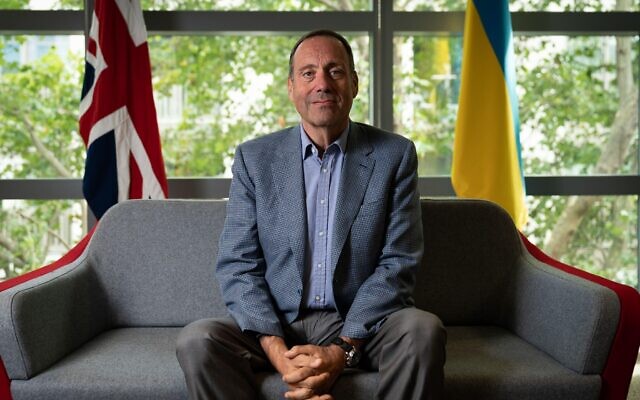Former refugee minister: We’ve given homes to 150,000 Ukrainians, but I fear for scheme’s future
Speaking to Jewish News on the first anniversary of the war in Ukraine, Richard Harrington encourages the government to keep housing scheme alive

One year after Russia launched its war against Ukraine, former former Refugee Minister Richard Harrington spoke to Jewish News about how the UK went from being ill-equipped to take in refugees to housing more than 150,000 people six months later.
Harrington had already left public life when the war in Ukraine began, until he was rushed back to his old role as refugee minister.
“Boris Johnson called me one day because he made a promise to Zelenskyy that we would take an uncapped number of refugees from Ukraine. And they didn’t have a real idea how to deal with it,” Harrington said.
Harrington, who was born into a Jewish family, described how important the task was for him, having three grandparents who were all refugees from Ukraine and Russia.
“Our ancestors were in this position, persecuted by the Czar, who is basically Putin today,” he said.
Off to a rocky start, Harrington recalled some of the major challenges the UK was facing in terms of taking in refugees.
“We didn’t have the mechanisms to process visas quickly and there was nowhere to put people because we had taken quite a few Afghan refugees and put them in hotels. So we came up with the idea of putting them (Ukrainian refugees) in people’s houses,” Harrington said.
“Our ancestors were in this position, persecuted by the Czar, who is basically Putin today,” he said.
The government didn’t want to set up refugee camps, which is often what other countries did in refugee crises: “The problem with the camps is that people stay there, and it’s very unsuitable for them. We wanted them to be welcomed in to our communities.”
Over 210,000 Brits signed up to take in Ukrainian refugees. To avoid anyone exploiting the situation, the government did background checks to make sure the applicants didn’t have a criminal record and that their house actually existed.

Although not permanently implemented, the housing scheme was already launched as a pilot project when Harrington served in the same role under Prime Minister David Cameron, where some 500 Syrian refugees were put in people’s homes.
The UK has now taken over 150,000 Ukrainian refugees in since the start of the war last year, but many won’t be able to stay with their sponsors for a variety of reasons.
The Guardian, BBC, The Independent and Time Magazine have all reported that a homelessness crisis is looming, which according to Harrington is partially true.
“Homeless doesn’t mean they are simply put on the street. 75% of those who took in refugees extended their period after six months. The remaining 25% are either offered another host, or the local authority has a duty to put them into accommodation,” Harrington said, adding that over 60% of Ukrainian refugees over 18 are now employed, which gives them a better chance of being completely independent.
When Harrington resigned from his position in September last year, he encouraged the government to double the stipend for hosts, from £350 to £700 per month. A compromise was eventually reached, given each host £500.
“I felt that the extra money would allow lot of people in the poorer areas of the country to continue opening their homes to refugees,” he said.
When asked what advise he would offer Prime Minister Sunak’s government vis a vis Ukraine, Harrington said it’s vital to keep the sponsorship scheme alive.
“I would like to see the scheme continuing, and not just for refugees from Ukraine but for other people in the world experiencing a humanitarian crisis. My fear is that the system will wound down when the Ukraine war is over.

On the widely discussed issue of sending fighter jets to Ukraine, Harrington said it’s “much more complicated than people think. It’s one thing for politicians to talk, but fighter jet pilots are very difficult to train.”
“Each plane needs about 20 people around it to deal with all the things that go with it. But I do hope the world steps up and helps Ukraine defend itself. Basically, they are all doing it for all of us,” he added.
The UK likes supporting the underdog, Harrington said, which Ukraine is a great example of. The former minister also recalled how thousands of people took to the streets in the UK to support Israel during the six-day war in 1967, which was also seen as the underdog then.

Thank you for helping to make Jewish News the leading source of news and opinion for the UK Jewish community. Today we're asking for your invaluable help to continue putting our community first in everything we do.
For as little as £5 a month you can help sustain the vital work we do in celebrating and standing up for Jewish life in Britain.
Jewish News holds our community together and keeps us connected. Like a synagogue, it’s where people turn to feel part of something bigger. It also proudly shows the rest of Britain the vibrancy and rich culture of modern Jewish life.
You can make a quick and easy one-off or monthly contribution of £5, £10, £20 or any other sum you’re comfortable with.
100% of your donation will help us continue celebrating our community, in all its dynamic diversity...
Engaging
Being a community platform means so much more than producing a newspaper and website. One of our proudest roles is media partnering with our invaluable charities to amplify the outstanding work they do to help us all.
Celebrating
There’s no shortage of oys in the world but Jewish News takes every opportunity to celebrate the joys too, through projects like Night of Heroes, 40 Under 40 and other compelling countdowns that make the community kvell with pride.
Pioneering
In the first collaboration between media outlets from different faiths, Jewish News worked with British Muslim TV and Church Times to produce a list of young activists leading the way on interfaith understanding.
Campaigning
Royal Mail issued a stamp honouring Holocaust hero Sir Nicholas Winton after a Jewish News campaign attracted more than 100,000 backers. Jewish Newsalso produces special editions of the paper highlighting pressing issues including mental health and Holocaust remembrance.
Easy access
In an age when news is readily accessible, Jewish News provides high-quality content free online and offline, removing any financial barriers to connecting people.
Voice of our community to wider society
The Jewish News team regularly appears on TV, radio and on the pages of the national press to comment on stories about the Jewish community. Easy access to the paper on the streets of London also means Jewish News provides an invaluable window into the community for the country at large.
We hope you agree all this is worth preserving.





















